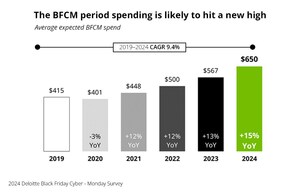Deloitte: Unexpected Global Skill Shortages Threaten Corporate Growth and Innovation
Survey of Senior Executives and Talent Managers Shows Future Leadership, and Research & Development, Are Hardest Hit
NEW YORK, Dec. 8, 2010 /PRNewswire/ -- High unemployment rates in both the United States and in some global markets have not created the talent surplus that many organizations and business leaders would have expected, according to a new survey released today by Deloitte and Forbes Insights. In fact, the quest for talent in global and emerging markets is the leading concern among 41 percent of the corporate executives and talent managers surveyed, and a slightly more pressing concern for companies in Europe, the Middle East and Africa (48 percent) than their counterparts in the Americas or Asia-Pacific countries (35 percent and 41 percent, respectively).
The Deloitte/Forbes Insight Survey, "Talent Edge 2020," also reveals potential critical shortfalls in research and development (R&D) skills and executive leadership. Nearly three-quarters of executives surveyed (72 percent) anticipate either a severe or a moderate shortage in R&D talent, while more than half of those same executives (56%) stated they expect the same magnitude of shortage among executive leadership.
"What we are seeing is an unexpected talent paradox -- even though unemployment rates remain relatively high in the US -- companies are struggling to find the skilled workers they need to fill critical jobs worldwide," explained Jeff Schwartz, a principal in the human capital practice of Deloitte Consulting LLP and global co-leader and U.S. leader for talent services.
"During the recession, most executives were churning their business and talent strategies into survival mode, not success mode – this has to change or corporate growth and innovation will be severely challenged," Schwartz added.
The R&D shortage is particularly prevalent in industries where product innovation is critical. Among technology, media and telecom companies, 40 percent of those surveyed predict a severe shortage of R&D talent, while 39 percent of consumer/industrial companies and 37 percent of life sciences and healthcare companies surveyed foresee severe skill shortages in this area.
The survey further shows that many executives are concerned about their companies' leadership development programs and pipelines. More than half of respondents (56 percent) predict shortages in executive leadership, and 63 percent are either highly or very highly concerned about employee retention over the next 12 months.
"This is where the talent paradox poses the biggest threat – not only are companies struggling to find the right skill sets to fill critical jobs, but they are worried about their ability to keep the talented workers they have," said Schwartz. "And, these are concerns worldwide – not just in a company's backyard. So, if companies are not thinking about talent and workforce issues in a global way, they are not thinking about them in the right way."
Positively, the survey shows promise that most companies are thinking globally. When asked to look ahead and predict where their talent strategies are headed, nearly two out of three respondents predicted that their companies will increase their focus on global diversity management (65 percent) and global mobility (64 percent) over the next year.
And, most survey participants are aware that changes need to be made. Approximately, 80 percent admit that their talent programs need improvement, while only one in five executives rate their company's programs as "world-class." According to Deloitte's analysis of the survey data, the self-described "world-class" firms have a different set of priorities and a stronger focus on long-term talent investments than other companies. For example, when compared to companies whose talent programs need to be improved, "world class" companies are more likely to make investments in creating career paths and challenging opportunities for employees (46 percent for "world-class" firms vs. 36 percent for all others), developing leaders and succession planning (48 percent vs. 36 percent), and recruiting hard-to-find skill sets (42 percent vs. 29 percent).
About the Survey
"Talent Edge 2020" is a second longitudinal survey series conducted in collaboration with Forbes Insights. The survey includes 334 senior executives and talent managers at large companies worldwide, across a range of major industries. Following in the path of Deloitte's 2009-2010 survey series, Managing Talent in a Turbulent Economy, this latest research is aimed at exploring talent strategies and concerns of global companies and unfolding trends as companies confront a fresh set of challenges in the next decade and beyond. For more information on Deloitte's "Talent Edge 2020" survey, please visit: http://www.deloitte.com/view/en_US/us/Services/additional-services/talent-human-capital-hr/Talent-Library/talent-edge-2020/index.htm
For more information about Deloitte's Human Capital practice, please visit http://www.deloitte.com/humancapital.
As used in this document, "Deloitte" means Deloitte LLP and its subsidiaries. Please see www.deloitte.com/about for a detailed description of the legal structure of Deloitte LLP and its subsidiaries.
SOURCE Deloitte
WANT YOUR COMPANY'S NEWS FEATURED ON PRNEWSWIRE.COM?
Newsrooms &
Influencers
Digital Media
Outlets
Journalists
Opted In





Share this article